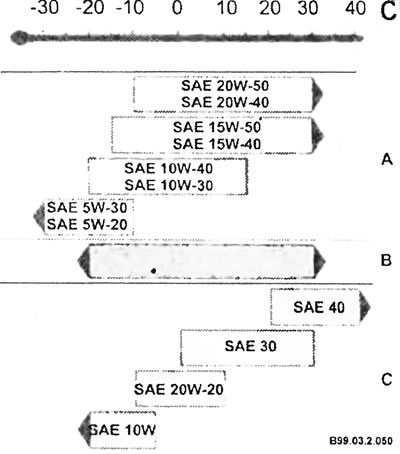All seasonal engine oils can be used for the engine. All-season motor oils have the advantage of being suitable for temperature differences (summer Winter). All-season motor oils are based on low-viscosity seasonal motor oil (e.g. 10W). Due to the so-called hardener, the oil is stabilized when hot, and therefore provides the necessary lubricity for any operating condition. If you use all-weather engine oil, then you need to take a modern oil with a large viscosity range (e.g. 10W-40, 15W-50).
Letter «W» according to the SAE system means that the oil is suitable for the winter season. When using light oils, we are talking about multigrade oils, in which a friction coefficient reducer is added, which ensures fuel savings of up to 2%. Lightweight oils have a low viscosity (e.g. 10W-30). They require substandard base oils (synthetic oils). Basically, HD oils are used in modern engines. HD oils are alloyed oils, the lubricating properties of which are significantly improved by the addition of various chemically active substances. These additives contribute to better protection against corrosion and oxidative phenomena. They provide, in particular, a slight tendency to form slag in the engine crankcase, better viscosity, cleaning and dissolving properties. Cleaning and dissolving additives not only reduce the formation of residues in the engine, but also have the ability to dissolve these residues, distribute them and other impurities in the engine oil and keep them constantly in suspension, so impurities also merge when changing the oil. The quality of HD engine oil is determined by the API system (API - American Petroleum Institute). Denoted by two letters. The first letter indicates the field of application S - service, intended for gasoline engines, C - commercial, intended for diesel engines. The second letter means quality in alphabetical order. The highest API quality oils are classified as SF for spark-ignition internal combustion engines and CD for diesel engines.
Engine oil additives
The use of additives, no matter what grade, in lubricating oils can lead to undesirable oil mixture composition, and the use of oils with additives that extend their life is questionable, especially when using oils for heavy duty conditions - this is the opinion of some leading automotive manufacturers technology. In any case, additives should be used very carefully.
WARNING: CD engine oils, which are designated by the manufacturer as diesel engine oils, are not suitable for spark ignition internal combustion engines. There are oils that are suitable for both gasoline and diesel engines. In this case, two classifications are indicated on the bank (e.g. SF, CD).
Synthetic oils
There are many excellent and high performance oils available that provide longer mileage, longer service intervals and in some cases better engine protection. They help the engine run smoothly, but their main difference is that the price of synthetic oils is 3 or 4 times more than conventional oils.
Synthetic oil is not for every car enthusiast and every driving style, so you need to analyze the condition of your car's engine and your driving style. Thus, the results of this analysis may be the basis for the use of synthetic oils.
New engines and older high mileage engines are poor candidates for synthetic oil. Synthetic oils are «slippery» that they may interfere with proper break-in of a new engine, most oil manufacturers recommend waiting until the engine has been driven for about 800 km (in break-in mode), and only then use synthetic oil. Older engines with wear when using synthetic oil also do not work without problems; they consume more oil during operation, the older the engine. «slippery» synthetic oils easily pass worn parts. If your engine uses conventional oil, it will use synthetic oil much faster. If your car is leaking oil from the seal, the synthetic will leak even more.
Consider your driving style. If you drive a lot at high speeds on motorways, then a more expensive synthetic oil may be preferable. Heavy motorway traffic gives the engine a chance to warm up, collect less acids in the oil, and not be heavily stressed on a long trip. Under these conditions, the interval between oil changes can be extended (as long as the oil filter can keep the oil in good condition) up to the limit specified by the synthetic oil manufacturer. Vehicles with synthetic oil use slightly less fuel when driving on the motorway due to less internal friction. However, many auto experts agree that 30,000 miles is too long to find any oil in a car.
Vehicles used in severe conditions such as «stop - move», urban driving, short trips or frequent idling, should be serviced more frequently. For the engines of these vehicles, the higher price of synthetic oils can play a significant role in vehicle maintenance costs. Internal wear on such vehicles occurs faster, causing increased oil consumption and leakage.
CAUTION: Mixing conventional and synthetic oils is prohibited. If you use synthetic oil, then it makes sense to carry several liters of the same oil with you, because. not everywhere this type of oil can be on sale.
The indicated temperatures are the prevailing air temperatures. Short term fluctuations play roles.
Oil application schedule depending on ambient temperature

A - off-season oil; B - synthetic oil; C - seasonal oil.
Easily determine oil viscosity
The viscosity of the oil can be approximately determined by rubbing a few drops with your fingers. The oil to be rubbed must not be heated. If warmth is felt, then the oil has insufficient viscosity. The pungent smell of gasoline in it indicates the dilution of the oil by fuel.
CAUTION: On a heavily worn engine, insufficient oil pressure may be caused by a clogged intake strainer strainer.
